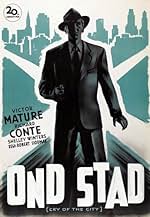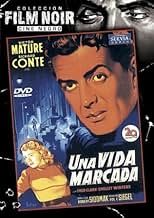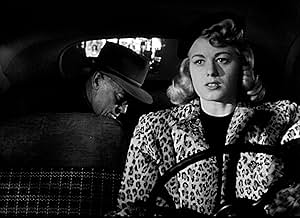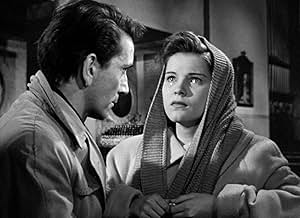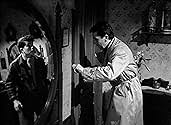Adicionar um enredo no seu idiomaPolice Lieut. Candella, longtime friend of the Rome family, walks a tightrope in the case of cop-killer Martin Rome.Police Lieut. Candella, longtime friend of the Rome family, walks a tightrope in the case of cop-killer Martin Rome.Police Lieut. Candella, longtime friend of the Rome family, walks a tightrope in the case of cop-killer Martin Rome.
- Direção
- Roteiristas
- Artistas
- Prêmios
- 1 indicação no total
- Man
- (não creditado)
- Mama Roma
- (não creditado)
- Barber
- (não creditado)
- Mr. Masselli
- (não creditado)
- Elevator Operator
- (não creditado)
- Rosa
- (não creditado)
- Detective Loomis
- (não creditado)
- Direção
- Roteiristas
- Elenco e equipe completos
- Produção, bilheteria e muito mais no IMDbPro
Avaliações em destaque
It's not as if Marty never had a choice. The film stresses the decency of Marty's upbringing. The family is 'deserving poor' - crucifix on the living-room wall, mother attending Mass every day, display case of war medals in the back room. Marty's girlfriend, Teena Riconti, is also from an honest family. So what turned Marty bad? This is analysed through the treatment of Tony, Marty's kid brother. Tony is on the cusp of manhood and beginning to adopt Marty's warped values. Can he be saved, or will he inevitably gravitate towards the "poolroom hotshots"?
Lest we conclude that moral depravity is the preserve of immigrants or even the urban poor, the film offers us Niles, the crooked lawyer. Played by Berry Kroeger with almost Wellesian flamboyance, Niles is the distillation of nastiness - a man with every advantage in life who still elects to sup with the devil. Twentieth-Century Fox's films noirs exhibited little love for attorneys, but Niles is probably the most unpleasant of them all.
Victor Mature and Richard Conte are in great form as Candella and Marty respectively. There is no real romantic sub-plot - Teena appears briefly at the beginning and the end, but plays no part in the story - and Candella is too busy making himself at home in the Rome household to go out and get a girl. Shelley Winters plays Brenda, one of Marty's dumb broads. For her, here in 1948, the typecasting had already begun.
As always, noir uses external scenery to symbolise internal emotion in the classic expressionist manner. Marty and Teena are filmed through the bars of the hospital bed-head, representing both the imprisonment awaiting Marty and the way in which Society is bearing down on these two, restricting their options. The hospital architecture is much vaster than the human scale, making a similar point - we like to think of ourselves as autonomous individuals, captains of our own destinies, but we are little more than insects, and the nest we have built around us dominates our existence. Marty's journey through the tunnel of the prison hospital is like an expressionist bad dream, a virtual street with pedestrians and vehicles, but no sky. Arches are everywhere. Marty's hospital ward is a forest of arch shapes. Niles' office has two arched windows whose insistent geometry dominates the screen. The church continues this motif with its lines of arches overhead. The city is our nest, and its institutions are the linked burrows through which we are obliged to scurry. Neon signs continually force themselves on our attention - the Gillette ad in the street, and the garage sign intruding through Rose Gibbons' apartment window. Just as with the terrific el-train shot, the city creeps into our consciousness, never allowing us to forget that we are living in its bowels.
Tony's moral crisis centres on the hard decisions which his bad-guy brother forces him to make. We see his hesitation when Marty tells him to take Candella's gun, then later when he is asked to steal the family's savings. In the church, the wall picture shows Christ falling with His cross. When, moments later, Candella the Christ-figure slumps to the pavement, it is Tony who (quite literally) supports the police.
In fact, the film features a number of unusual and unheralded players that spice up the proceedings—Walter Baldwin as the trustee Orvy, crooked teeth and all; Betty Garde as plain- looking nurse Pruett, who takes no guff from anybody including cops; and Barry Kroeger as puffy-face lawyer Niles, an insult to his profession. These are not pretty people in the usual Hollywood sense, and I think one of the fascinations of noir is to feature such types at a time when movies prized good-looking people above all. Here, along with the shambling Emerson, they leave us with an impression of real city streets instead of a casting call along Hollywood and Vine.
Among the more conventional, it's fun to see a still slender Shelley Winters (Brenda) doing her cheap blonde bit as she fends off a tipsy masher in a bar. Her character sort of drops into the narrative out of nowhere, making me wonder whether something connective got edited out. Frankly, headliner Victor Mature (Candella) hasn't much to do except stand around and look handsomely imposing. Instead, co-star Conte gets all the best scenes, good lines, and audience interest. At the same time, something should be said for young Tommy Cook who makes a good gritty impact as Conte's younger brother.
Then too, check out director Siodmak's visual approach to the filming. Usually the light and shadow of expressionist noir takes place on a sound stage where control is absolute. But here, the imaginative Siodmak mixes expressionist light and shadow with location shooting to create an unusual overall effect. Note the number of location shots without the natural lighting that ordinarily would create a more documentary feel. It's a curious but effective blend. In passing—note too Siodmak's beautifully paced direction of the jailbreak sequence, a really suspenseful look at bureaucratic paper-shuffling, in this case, a police department.
The story itself is pretty shopworn—two friends growing up together in the ghetto, where one ends up becoming a cop, while the other turns to crime. In short, the sort of thing Cagney and O'Brien did in the 30's. Nonetheless, Siodmak's imaginative approach, plus the many interesting characters and entertaining vignettes make this version a noir worth catching up with.
Victor Mature "Lt. Candella") and Richard Conte ("Martin Rome") both do a very credible job as the good and bad guys, respectively.
Shelley Winters, Debra Paget and Hope Emerson all provide solid female acting support in this little-known film noir. Emerson ("Rose Given") might be the least known of the three, but not to me since I am a big fan of the Peter Gunn TV series of the late 1950s in which she played a key role.
With film noir making a comeback in recent years, I hope someone puts this movie out on DVD.
"Cry of the City" is a moralist police story, with the fight between good, represented by Lt. Candella, and evil, represented by Martin Rome. Both characters have the same origins in the lower class neighborhood, but follow different paths of law: while Candella accepts to earn a low salary and "sleep well at night", the manipulative Martin uses people and prefers to taste the pleasures of life whatever the final price is. Their duel has a predictable and corny conclusion, but the story is engaging and supported by a beautiful black and white cinematography and good acting. My vote is seven.
Title (Brazil): "Uma Vida Marcada' ("A Marked Life")
Note: On 20 Dec 2018, I saw this film again. Now my vote is eight.
Plot-wise, CRY OF THE CITY is that old chestnut about two boys from the same neighborhood (New York's Little Italy, presented with far more nuance and authenticity than Hollywood's usual spaghetti-with-meatballs style) who grow up on opposite sides of the law. Lieutenant Candella (Victor Mature) pursues Martin Rome (Conte) relentlessly after he escapes from a prison hospital; Rome is determined to clear his girlfriend of suspicion in a jewel theft by finding the real culprits. The plot is just a scaffolding to support a series of scenes in which Rome and Candella alternately vie for leverage and influence over an eclectic parade of supporting characters, all of whom seem driven by fear or greed. Desperation inhabits the city like weather. Director Siodmak, one of the masters of film noir, suffuses the film with a dark mood, atmospheric locations, and those corrupted personal transactions that define the genre.
In a hospital in the middle of the night a priest murmurs and family-members weep quietly over a dying man who is chained to his bedMartin Rome has just killed a cop in a shoot-out. Later, after he has escaped and collapsed again, his girl (Shelley Winters in a leopard-print coat) enlists an unlicensed foreign doctor to treat him in the back seat while they drive around damp city streets, using neon signs for light. Stolen jewels get stashed in a locker in a subway station. Marty almost meets his match in a massive, burly masseuse (Hope Emerson), who looms over him as he works his bright-eyed, caressing charm. Their scene together is funny, scary and perversely titillating all at once, as the mountainous woman starts to massage his back and then gets her hands around his throat. Sadder is Marty's seduction of a plain, middle-aged hospital nurse who is burdened, we later find out, with a nasty, selfish, annoying old mother. At one point Candella reads off to Marty a list of all the former girlfriends the cop has had to look up, and Marty amusingly reacts to each name with regret, embarrassment or fondness. For this tough guy, sex appeal is as powerful a weapon as a gun or a knifesometimes it's the only one he has.
All the time we're rooting for Martyat least I was. CRY OF THE CITY perfectly demonstrates how easily movies can mess with one's moral compass. Marty is a killer and a selfish, remorseless crook, but his élan and vulnerability make him an irresistible underdog. His adversary, Candella, is a self-righteous moralizer, a monomaniacal Javert whose hatred seems inspired more by his enemy's charisma than by his crimes. Victor Mature's heavy, stolid presence sharply contrasts with Conte's proud, dazzling quickness. Someone once described Mature as an intelligent actor cursed with the face and physique of a dissipated life guard; I forget who wrote that, but it hits the nail on the head. The poor guy *looked* like a bad actorall beef and no brainseven though he wasn't. Here his scenes with the Rome family are intended to soften his character, and he does have likable moments, but the way he turns them allfinally even the kid brotheragainst Marty only increased my sympathy for the endangered outcast. His accusation that Marty uses people is fair enough, but he lays it on too thick; it wasn't Marty's idea to enlist the illegal doctor or the "trusty" who helps him break out of jail. Booming, "Stop in the name of the law!" Candella embodies implacable authority, and who could root for that?
I like to think that in real life superficial concerns like these wouldn't get in the way of my knowing right from wrong, but this is a movie; style is bound to trump substance. Are films like this onemade under the Hays Code, when movies were not allowed to openly glorify criminalsdeliberately subversive? The script says one thing, but the casting says another. In a way, that hypocrisy is essential to noir, an under-the-radar phenomenon that made caustic comments about human nature while ostensibly endorsing the Ten Commandments. For Martin Rome, a premature death isn't too high a price to pay for all the fun he had breaking the rules. And a clichéd ending is not too high a price for the pleasure of this movie.
Você sabia?
- CuriosidadesThe film was set to be released under the title of "The Law and Martin Rome", when a lawyer from Baltimore, Maryland named Morton E. Rome contacted the studio threatening to sue, saying the film would damage his career and expose him to ridicule. Exhibitors were also objecting to the title, so to please them and avoid the suit the title was changed just before the film's release.
- Erros de gravaçãoPhantom Bullet: During the struggle in his office, Niles fires his gun, missing Marty but killing the woman eavesdropping outside the frosted glass door. Yet the glass does not shatter, nor is there a hole in the surrounding woodwork or plaster...as if the sound alone killed her.
- Citações
Martin Rome: I had enough of that when I'm a kid. Crummy tenements, no food, no clothes.
Lt. Vittorio Candella: Oh, save it for the jury, Marty. Who do you think you're kidding? l was brought up in the district too. I've heard that dialogue from you poolroom hotshots ever since l was ten years old. Get hip... only suckers work... don't be a square... stay with the smart money. Let the old man get the calluses digging the ditches. No food... no clothes... crummy tenements. You're breaking my heart, Marty.
- ConexõesEdited into American Cinema: Film Noir (1995)
Principais escolhas
- How long is Cry of the City?Fornecido pela Alexa
Detalhes
- Data de lançamento
- País de origem
- Centrais de atendimento oficiais
- Idiomas
- Também conhecido como
- Una vida marcada
- Locações de filme
- Nova Iorque, EUA(Hester Street)
- Empresa de produção
- Consulte mais créditos da empresa na IMDbPro
- Tempo de duração
- 1 h 35 min(95 min)
- Cor
- Proporção
- 1.37 : 1



